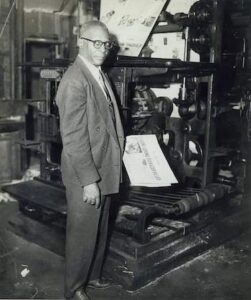
Carter Westley
*Carter Wesley was born on this date in 1892. He was a Black lawyer, newspaperman, and political activist.
Carter Walker Wesley was born in Houston, Texas. He grew up in the city's first and most successful Black neighborhood, Freedmen's Town. Shortly after completing high school, Westley moved to Nashville, Tennessee, and graduated magna cum laude in 1917 from Fisk University. Soon after graduation, World War I started and interrupted his plans.
He enrolled in a Black officer's training camp at Fort Des Moines in Iowa and eventually was commissioned as a first lieutenant. Wesley served in Europe, fighting in the Argonne and Verdun regions. He was released in 1919 after returning from the 93rd Infantry Division. Before World War I, he attended law school at Northwestern University and became an attorney active in civil rights issues. Taking inspiration from 20th-century black leaders and writers, he joined the NAACP and started a career in law. At one point, he suggested that the NAACP stop depending on white attorneys working on Texas cases.
Wesley worked with Thurgood Marshall to fight the state of Texas and the Texas Democratic Party to end the racially discriminatory white primary election. Texas claimed it had no role in the primary because that was the exclusive domain of the state Democratic Party. Wesley and his law partner James Nabrit Jr. challenged this theory, but the Court upheld the white primary in Grovey v. Townsend (1932). Wesley did not give up the fight. Although it took until 1944, in Smith v. Allwright (1944), the Court finally struck down the Texas white primary, finding that the discriminatory voting practice was unconstitutional. Wesley was also an instrument in desegregating the University of Texas Law School by supporting Heman Sweatt, who they did not admit because he was Black. Wesley even employed Sweatt at one of his newspapers while the suit went through the courts. Wesley eventually switched all of his focus to the news publishing industry.
He worked with the Houston Informer, a newspaper for Blacks, and became the paper's editor in 1929. Wesley was then promoted to vice president of the newspaper company in 1930 and became the manager by the end of 1932. He eventually took a controlling interest in the newspaper and helped it grow to become, in 1945, the largest black-owned business in Houston.
Wesley also owned the Dallas Express, one of the papers published by Freedman's Publishing Company. He was sent with ten other black publishers to Germany to "investigate claims of discrimination against black servicemen in that country." Wesley was married to Dorris Wooten and had three children. After becoming a lawyer and newspaper publisher, he died in Houston on November 10, 1969, aged 77, and was buried in Paradise Cemetery (North) in Houston, Texas.